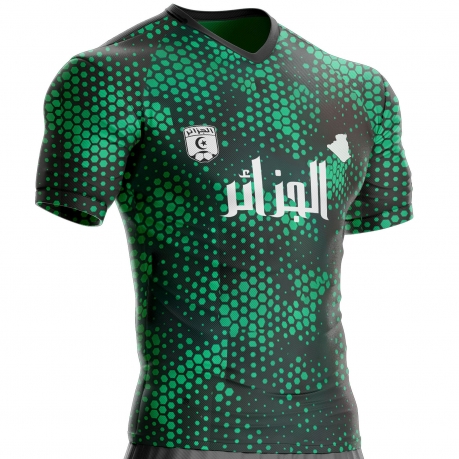Explanation of the rivalry of the Tunisia VS Algeria football match

The eruption of the volcano: Tunisia-Algeria, a football rivalry on edge
On November 14, 2009, the Radès stadium in Tunisia was in turmoil. The return match of the qualifiers for the 2010 World Cup pitted Tunisia against Algeria. The score was close, the stakes immense. In the 88th minute, a Tunisian goal triggered an explosion of joy in the stands. Qualification for the World Cup was in hand. But the joy of the Tunisians quickly turned into anger when Algerian supporters threw projectiles onto the pitch. The match was interrupted and images of chaos went around the world.
This incident is just one example of the intense rivalry that exists between the Tunisian and Algerian national football teams. More than a simple sports match, this confrontation is a meeting between two nations with intertwined histories and cultures, but also very real tensions and frustrations.
Football is a religion in Tunisia and Algeria. It brings people together, expresses national identities and provides an outlet for popular passions. When the two teams meet, the stakes go beyond the sporting framework. It is a matter of national pride, honor and sibling rivalry.
In this article, we will explore the deeper origins of this historic rivalry. We will analyze its evolution on the ground and its impact on relations between the two countries. Finally, we will wonder about the future of this confrontation and the possibility of overcoming tensions to celebrate sport and fair play.
Origins of the rivalry
The football rivalry between Tunisia and Algeria cannot be understood without delving into the common history of the two countries. Enemy brothers, united by a long border and a shared culture, but also divided by centuries of colonial domination and struggles for independence.
From the first friendly matches organized in the 1950s, the tension was palpable. Football became a field of symbolic expression of national aspirations, a means of asserting one's identity and pride in the face of the French oppressor. The sporting rivalry was fueled by the political and social tensions of the moment.
The independence of the two countries in 1962 did not ease the rivalry. On the contrary, it exacerbated nationalist sentiments and the desire for sporting supremacy. The matches between Tunisia and Algeria were an opportunity to demonstrate the strength and vitality of the young nation.
Development of the rivalry on the field
The first official match between the two national teams took place in 1963. Since then, they have faced each other 48 times, with a relatively balanced record (18 victories for Algeria, 15 for Tunisia and 15 draws).
Certain encounters have remained engraved in the collective memory. In 1975, Tunisia beat Algeria in the final of the African Cup of Nations, a national triumph experienced as symbolic revenge. In 1989, a qualifying match for the World Cup was marked by violent incidents and the invasion of the pitch by supporters.
Talented players have also contributed to the legend of this rivalry. The Tunisian Tarak Dhiab and the Algerian Rabah Madjer, both considered legends of African football, left their mark on the confrontations between the two teams.
The two teams' style of play also contributed to the rivalry. Tunisia are known for their technical play and ball possession, while Algeria are renowned for their physical commitment and speed on the counterattack. These differences in style create matches that are often intense and spectacular.
Sociocultural factors fueling rivalry
Football is much more than a sport in Tunisia and Algeria. It is a question of national pride, identity and belonging. During matches between the two teams, fans not only support their team, they defend their country and their culture.
Media and social networks play an important role in amplifying rivalry. Before matches, press articles and comments on social networks compete with superlatives and fuel tensions. The slightest provocation can trigger an avalanche of hateful reactions and inflammatory messages.
Chants and celebrations specific to this rivalry also contribute to the electric atmosphere of the matches. Tunisian fans often chant "Algeria, we beat you" while Algerian fans respond with "Tunisia, you are our cousins, but we will always beat you".
Debates and future perspectives
The rivalry between Tunisia and Algeria is a complex and multidimensional reality. Some see it as a source of division and hatred, while others see it as healthy emulation and a positive expression of sporting passion.
Is there a way to ease the tension and promote a more positive sportsmanship? Initiatives have been taken to encourage dialogue and fraternity between supporters of the two teams. Friendly matches were organized in a spirit of fair play and mutual respect.
The future of the rivalry will depend on the desire of both countries to overcome past tensions and build more peaceful relations. Football can be a tool for bringing people together and for dialogue. It is possible to transform rivalry into healthy emulation and celebrate sport in its universal dimension.
The rivalry between Tunisia and Algeria is a complex and fascinating story. It reflects a common history, political and social tensions, but also a shared passion for football. The future of this rivalry will depend on the ability of the two countries to overcome the divisions of the past and build a fraternal and peaceful future.
The rivalry between Tunisia and Algeria is a multidimensional reality which cannot be reduced to a simple sporting duel. It is the fruit of a complex common history, marked by struggles and tensions, but also by deep ties and a shared culture.
The historical and social context plays a crucial role in understanding this rivalry. Football has become a field of symbolic expression of national aspirations and popular frustrations. National pride and sense of identity are at stake during matches between the two teams.
Football has a significant impact on society. It can be a factor of division and hatred, but also a tool for rapprochement and dialogue between people. The rivalry between Tunisia and Algeria is an opportunity to reflect on the place of sport in society and its potential to overcome divisions and build a more fraternal future.
It is possible to transform rivalry into healthy emulation and celebrate sport in its universal dimension. Encouraging dialogue and fraternity between supporters, organizing friendly matches in a spirit of fair play and mutual respect, are all initiatives that can help ease tensions and build a more positive future for relations between the Tunisia and Algeria.
Football is a universal language that can bring people together and transcend borders. By using it wisely, we can make sport an instrument of peace and progress for humanity.









